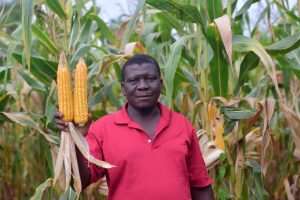
Almost 10,000 small and medium holder farmers have increased their maize yield from an average of 1.8 metric tonnes per hectare to 4.5 metric tonnes under the Sustainable Maize Program in the three regions in Northern Ghana.
Solidaridad West Africa revealed this when the Netherlands Ambassador to Ghana, Mr. Ron Strikker, paid a working visit to two beneficiary communities, Navariwie, and Kong in the Sissala West Municipal Assembly to inspect the progress of work.
The Sustainable Maize Program which started implementation in 2013, is a public-private partnership funded by the Netherlands Ministry of Foreign Affairs and the Masara N'Arziki Farmers Association.
Jointly implemented by Solidaridad West Africa and Masara N'Arziki Farmers Association across the three regions of the North, the project provides small and medium-scale holders with technical skills to adopt good agricultural practices and adapt to climate change.
Mr. Ron Strikker commended the farmers for expanding their farms to feed themselves and the country despite the challenges they face.
“This is the only way to become financially independent and come out of poverty”, he said.
Mr. Strikker urged the farmers to form a stronger cooperative in order to access grants and other financial support to help them further expand their production.
He promised additional technical support for farmers to improve their farming practices and contribute to the government's effort at making Ghana self-sufficient.

The Sustainable Maize Program fits with Solidaridad West Africa's Food and Climate Change initiative, which supports farmers to sustain yield increases and higher returns on labour in ways that are environmentally responsible.
The Programme Manager for Solidaridad West Africa, Abdulahi Aliyu, said the technical support provided to the project has been all-inclusive, addressing environmental concerns, access to inputs, storage, and a market for the produce.
“This has contributed immensely to the impressive results we witness today,” he added.
Under the programme, the Masara N'Arziki Farmers Association provides training on good agricultural practices; good land use and management practices; conservation farming practices; farmer group cohesion and dynamics, farming as a business to increase profit and access to good and guaranteed markets for its members.
The Director of Operations for the Association, Peter Kulve, said 9,747 beneficiary farmers have made significant progress in cultivating and expanding their maize farm after applying the knowledge gained from the training.
Mr. Iddrissu Basuglo, a beneficiary in Sakai, who will soon harvest 200 acres of maize, expressed his gratitude to the Netherlands Ministry of Foreign Affairs, Solidaridad West Africa and Masara N'Arziki Association for the support given to him and colleagues under the project.




 We’ll no longer tolerate your empty, unwarranted attacks – TUC blasts Prof Adei
We’ll no longer tolerate your empty, unwarranted attacks – TUC blasts Prof Adei
 Bawumia donates GHc200,000 to support Madina fire victims
Bawumia donates GHc200,000 to support Madina fire victims
 IMF to disburse US$360million third tranche to Ghana without creditors MoU
IMF to disburse US$360million third tranche to Ghana without creditors MoU
 Truck owner share insights into train collision incident
Truck owner share insights into train collision incident
 Paramount chief of Bassare Traditional Area passes on
Paramount chief of Bassare Traditional Area passes on
 Two teachers in court over alleged illegal possession of BECE papers
Two teachers in court over alleged illegal possession of BECE papers
 Sunyani: Victim allegedly shot by traditional warriors appeals for justice
Sunyani: Victim allegedly shot by traditional warriors appeals for justice
 Mahama vows to scrap teacher licensure exams, review Free SHS policy
Mahama vows to scrap teacher licensure exams, review Free SHS policy
 Government will replace burnt Madina shops with a new three-story, 120-store fac...
Government will replace burnt Madina shops with a new three-story, 120-store fac...
